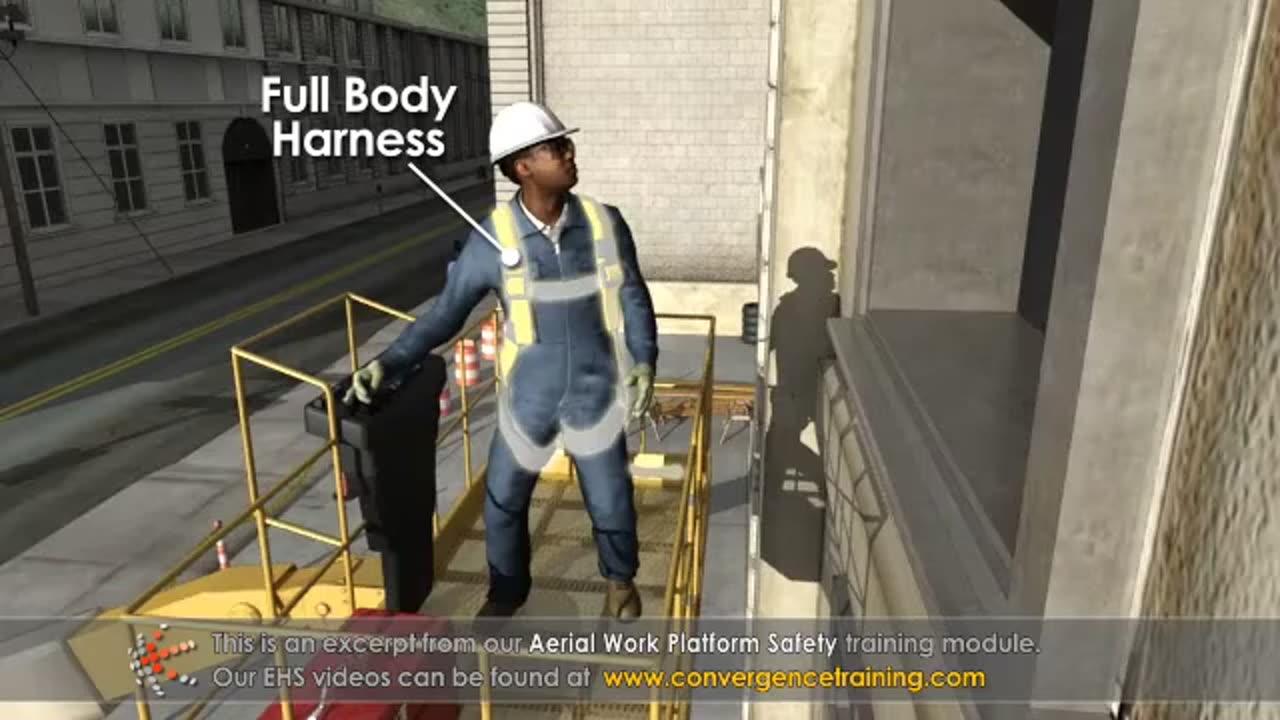Premium Only Content

Aerial Work Platform Safety Training
### **Aerial Work Platform (AWP) Safety Training Outline**
This training focuses on the safe operation of Aerial Work Platforms (AWPs), also known as Mobile Elevated Work Platforms (MEWPs), including boom lifts, scissor lifts, and vertical lifts.
---
### **1. Introduction to Aerial Work Platform Safety**
- **What are AWPs?**
- Types: Boom lifts, scissor lifts, vertical mast lifts.
- Common uses in industries.
- **Why AWP Safety is Critical?**
- Potential hazards: falls, tip-overs, electrocution, entrapment.
- Regulatory requirements (OSHA, ANSI A92.22 standards).
---
### **2. Pre-Operation Safety**
- **Training Requirements**
- Who can operate an AWP? (Authorized, trained, and certified personnel).
- Employer responsibilities for providing training.
- **Pre-Use Inspections**
- Checklist for visual and functional checks:
- Tires, brakes, outriggers, guardrails, controls, etc.
- Safety equipment (harnesses, lanyards).
- Reporting and addressing defects before use.
---
### **3. Hazard Identification and Control**
- **Environmental Hazards**
- Uneven terrain, slopes, and weather conditions.
- Proximity to power lines and overhead obstructions.
- **Operational Hazards**
- Overloading the platform.
- Improper positioning or movement of the lift.
- Unauthorized modifications.
---
### **4. Safe Operating Procedures**
- **Setting Up the AWP**
- Assessing the ground and surroundings.
- Using stabilizers and outriggers.
- Ensuring proper barricading to restrict access.
- **Working at Height**
- Wearing personal fall protection (harness and lanyard).
- Keeping tools and materials secure.
- Avoiding sudden movements or overreaching.
- **Moving the AWP**
- Ensuring the platform is lowered before movement.
- Maintaining a safe speed and direction.
- Spotter usage in crowded or tight spaces.
---
### **5. Fall Protection**
- **When Is Fall Protection Required?**
- Understanding guardrails and fall arrest systems.
- Correct usage of harnesses, lanyards, and anchor points.
- **Inspection and Maintenance**
- Checking fall protection equipment for wear and tear.
---
### **6. Emergency Procedures**
- **Rescue Plans**
- Responding to operator entrapment or lift failure.
- **Emergency Lowering**
- How to use ground controls to lower the platform.
- **Incident Reporting**
- Reporting accidents, near misses, and equipment failures.
---
### **7. Post-Operation Requirements**
- **Shutting Down the AWP**
- Properly parking and securing the equipment.
- Charging or refueling if needed.
- **Documentation**
- Logging inspections and maintenance activities.
---
### **8. Hands-On Practical Training**
- **Interactive Demonstrations**
- Performing pre-use inspections.
- Operating controls safely.
- Responding to emergency scenarios.
- **Assessment**
- Skills evaluation and operator certification.
---
### **9. Conclusion and Resources**
- Summary of key safety practices.
- Access to manuals, checklists, and training materials.
- Q&A session.
---
### Supporting Materials
Would you like:
- A **training manual** or **presentation slides**?
- **Pre-use inspection checklists**?
- **Scenarios for hands-on exercises**?
- Custom **certification tests** for operators?
Let me know how I can assist further!
-
 LIVE
LIVE
TheAlecLaceShow
2 hours agoNavy SEALs March on Washington for Pete Hegseth | The Alec Lace Show
164 watching -

Bare Knuckle Fighting Championship
1 day agoThe Bare Knuckle Show with Brian Soscia
2.68K -
 58:42
58:42
The Dan Bongino Show
4 hours agoWill Trump's Inauguration Be Safe? (Ep. 2400) - 01/14/2025
398K855 -
 LIVE
LIVE
Scammer Payback
1 hour agoTrying to Make Scammers mad LIVE
377 watching -
 1:04:50
1:04:50
The Rubin Report
2 hours agoCo-Host Stunned as Adam Carolla Gives a Brutal Unhinged Message to Democrats
37.1K15 -
 1:17:07
1:17:07
Russell Brand
3 hours agoBREAK BREAD EP. 10 - DALLAS JENKINS
54.3K3 -
 LIVE
LIVE
Benny Johnson
4 hours ago🚨Pete Hegseth Confirmation LIVE NOW as THOUSANDS Of Vets Show Support at Capitol | Trump CHEERS On
23,426 watching -
 1:33:12
1:33:12
Graham Allen
5 hours agoBiden is SABOTAGING Trump!! Says: “Our Economy Is Strong” + Elon Is Buying TikTok?!
81.7K34 -
 2:58:02
2:58:02
Matt Kohrs
14 hours agoPPI Inflation Report: Stocks Rip Higher (DJT, NVDA & TSLA) || The MK Show
54.6K3 -
 5:28
5:28
Dr. Nick Zyrowski
14 hours agoDopamine Detox - Get Your Energy, Sleep Quality & Focus Back
17.3K1